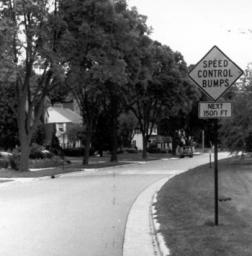Changing Our Street
There were many people driving down our street. They drove too fast, and my mother was worried. She thought they might hurt someone. She called the alderman’s office. The alderman is the representative of your part
of Chicago, a person who works in the government. Voters elect the aldermen, and anyone in the community can contact the alderman when there is a community problem. My mother had called them before when there was a problem with trash collection.
The alderman came to look at our street. He said, “Yes, I see the problem. But we need evidence so that I can persuade the office of Streets and Sanitation to come and fix it. I’ll be following up.” After he left wethought we would not get any help quickly, but we were wrong. The next day someone came to our street with a camera, and he stayed all day. It looked like he was taking photos of the street. I went to ask him what he was doing, and he explained that he had a device that was measuring the speed of cars. He said that he had already found ten cars speeding on our street. The next day a police officer came. She gave tickets to drivers who were speeding.
Then one week later workers came, and they installed a stop sign at the corner. Now cars would have to stop there. My mother felt relieved that this had happened. She said, “See what one phone call can do?”
But the cars still were going too fast. They would drive fast and then stop quickly, so it still was dangerous. We did not expect that a police officer could stay there all day to give drivers tickets. “We need to make another
call,” I said. This time I called the alderman’s office.
The next week workers came again, and this time they came in a big truck. They drew lines on the street. Then they poured concrete where the lines were. They worked all day, and at the end of the day, we had a way to slow the cars down. We had speed bumps.
Someone invented speed bumps. When you drive on a street and get to a speed bump you have to slow down. If you don’t slow down, you have a problem. Your car rocks up and down, and that can even knock some part off the car.
This story is part of our family’s history, now. We believe that we are responsible for our street and that other people should be responsible, too. My mother got a change made with one phone call, and then I got more
changes with another call. We have made our street a safer place because we took action.
